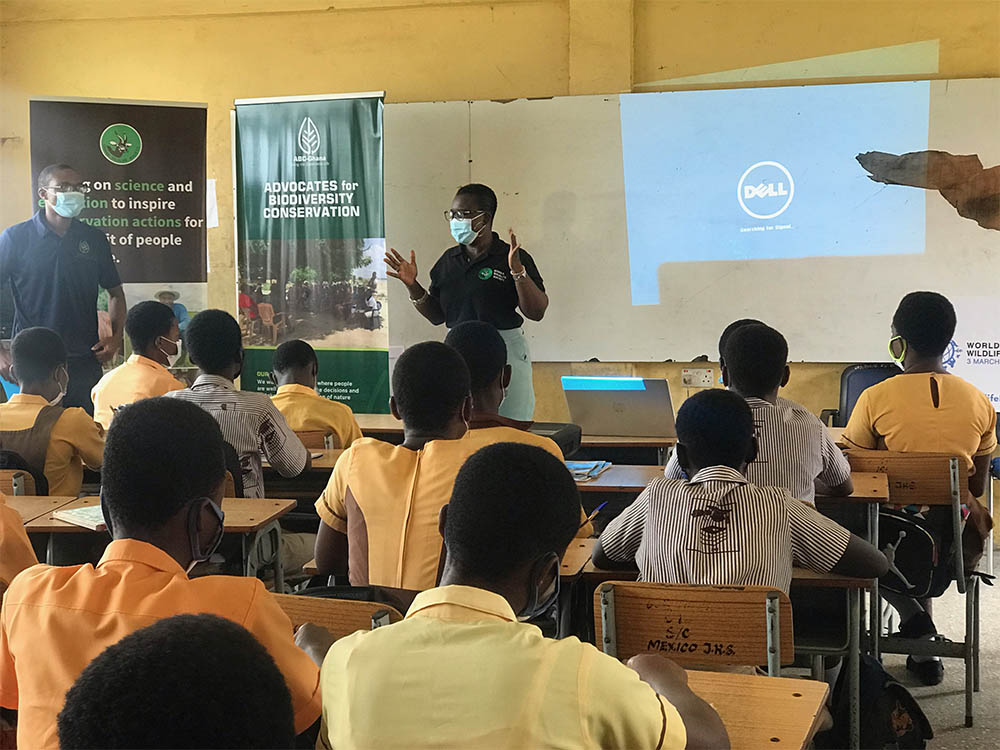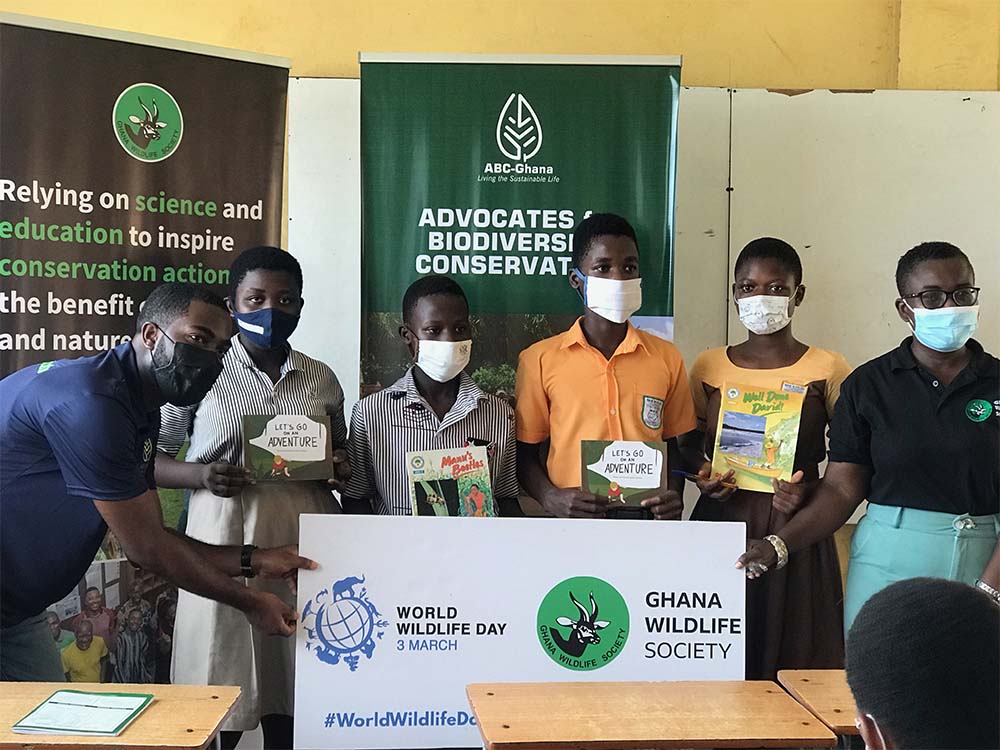Climate Change & Energy
Conserving Ghana’s Forest: Ghana Wildlife Society Takes Education Campaign To Basic Schools

Officials of Ghana Wilflife engaging students
The Ghana Wildlife Society has engaged students at the Junior High School (JHS) as part of activities to mark the World Wildlife Day which was observed on Wednesday March 3, 2020.
Partnering with wildlife clubs in the Tema Metropolitan Assembly of the Greater Accra Region, the schools targeted were the Price of Peace Presby, Mexico “2” JHS and Sakumono School Complex “2” JHS.
World Wildlife Day, is celebrated each year on 3rd March to commemorate the signing of the Convention on International Trade in Endangered Species of Wild Fauna and Flora (CITES) in 1973 and the theme for this year’s celebration was “Forests and livelihoods: Sustaining People and Planet".
A statement by the Ghana Wildlife Society said, the activities in the schools were to highlight the immense social and economic value of forests for communities in all corners of the world, particularly for indigenous and local communities in Ghana among the students at the basic level and get them to take actions to conserve forests.
At the Sakumono School Complex “2” JHS which is closer to Sakumono Ramsar Site, the students expressed their displeasure at the increasing rate of encroachment at the Site and have revealed their intention to write a petition and submit to the government.
As part of the activities, wildlife story books were donated to the schools after students were taken through education and awareness creation campaigns.
Growing demand for wildlife and risk of diseases
According to the statement, the theme for this year is particularly important given the intricate relationship between humans and forests and the repercussions of upsetting the fine balance.
“Forests are home to about 85% of life on land – both animal and plant species and at least, 1 billion people rely directly on forests to cover their most basic needs including food, shelter, energy and medicines. We all agree that the past 12 months were a wake-up call to rethink our relationship with nature as about 70% of emerging infectious diseases, and almost all recent pandemics including COVID-19 and Ebola, have originated in livestock and wildlife”, the statement revealed.
It said, forests have traditionally served as a natural barrier to disease transmission between animals and humans, but as people continue to encroach on wildlife habitats for agriculture and other illegal wildlife capture, the risk of diseases spilling over from wild animals to people rise exponentially.
“The growing demand for wild meat and the use of wild animals for traditional medicines, especially in urban settings, is increasing humans’ exposure to zoonotic diseases and hunting pressure in forests. Wildmeat is an essential source of food for millions of indigenous and rural people, accounting for more than 50% of protein intake in many tropical and subtropical regions. Already, recent studies estimate that 285 mammal species are threatened with extinction due to hunting for wild meat. This is an urgent call to protect and conserve the remaining wildlife we have”, the statement added.

students displaying their wildlife books
Current state of forest and wildlife in Ghana
In Ghana, deforestation and other illegal activities such as mining, popularly known as galamsey, chainsaw operations, agricultural expansion and bush burning have degraded about 85% of Ghana's Guinea Forest Region. Forest reserves alone have suffered average annual deforestation rates of 0.7%, 0.5%, 0.4%, and 0.6% for the periods 1990–2000, 2000–2005, 2005–2010 and 2010–2015, respectively.
Meanwhile, more than 10% of Ghanaians live at the fringes of forest reserves and benefit directly from timber and non-timber forest products such as mushroom, wild meat and herbs. Forest resources in Ghana contribute up to 38% to the income of Ghana's forest dwellers and about 6% annually to the Gross Domestic Product of the country.
The statement noted that, despite the government's efforts to maintain and protect Ghana's forest reserves, deforestation is still ongoing, adding that, at the current rate of deforestation, Ghana's forests could completely disappear in 25 years and would impact on the livelihoods of those who depend directly on the forest and the economy of the country as a whole.
“To curb deforestation and other illegal wildlife activities in Ghana, we suggest identifying and tackling the drivers of forest loss such as agriculture and galamsey, hunting and fishing for wild meat in a sustainable manner, through new and inclusive policies, practices and income-generating opportunities that make the most of both traditional knowledge and the latest technologies. Strengthening and enforcing forest protection laws could also minimise the extent of encroachment into forests and harvesting of forest species including threatened wildlife species”, it suggested.
The statement also urged Ghanaians to say ‘No’ to the consumption of threatened species and save forest by going digital with their bills, transactions and books to save paper.
“When we protect wild species, forests and landscapes, we are ensuring a sustainable future for us all and by protecting nature, we protect ourselves and remember without forests, we won’t be here”, the statement added.
Citations
(Acheampong et al., 2019) (Ahenkan & Boon, 2011; Appiah et al., 2009) (Boafo, 2013).
 students displaying their wildlife books
students displaying their wildlife books


 Officials of Ghana Wilflife engaging students
Officials of Ghana Wilflife engaging students
